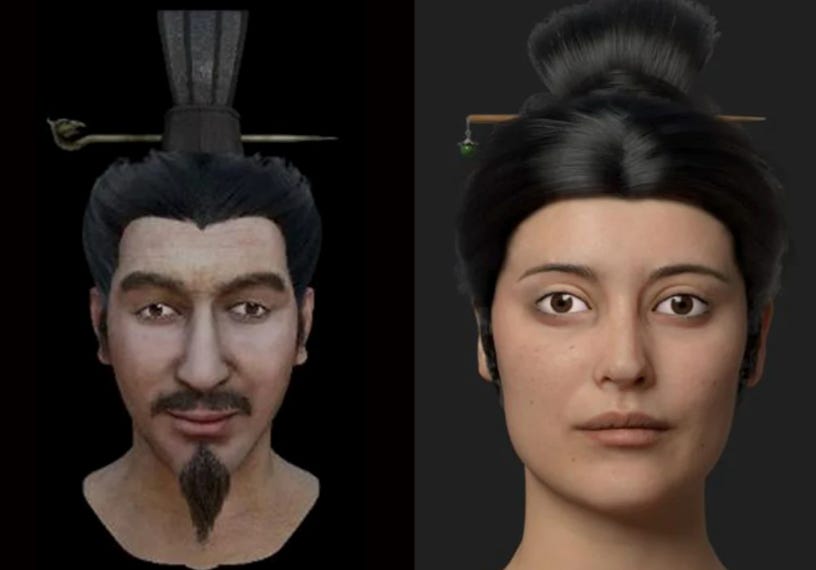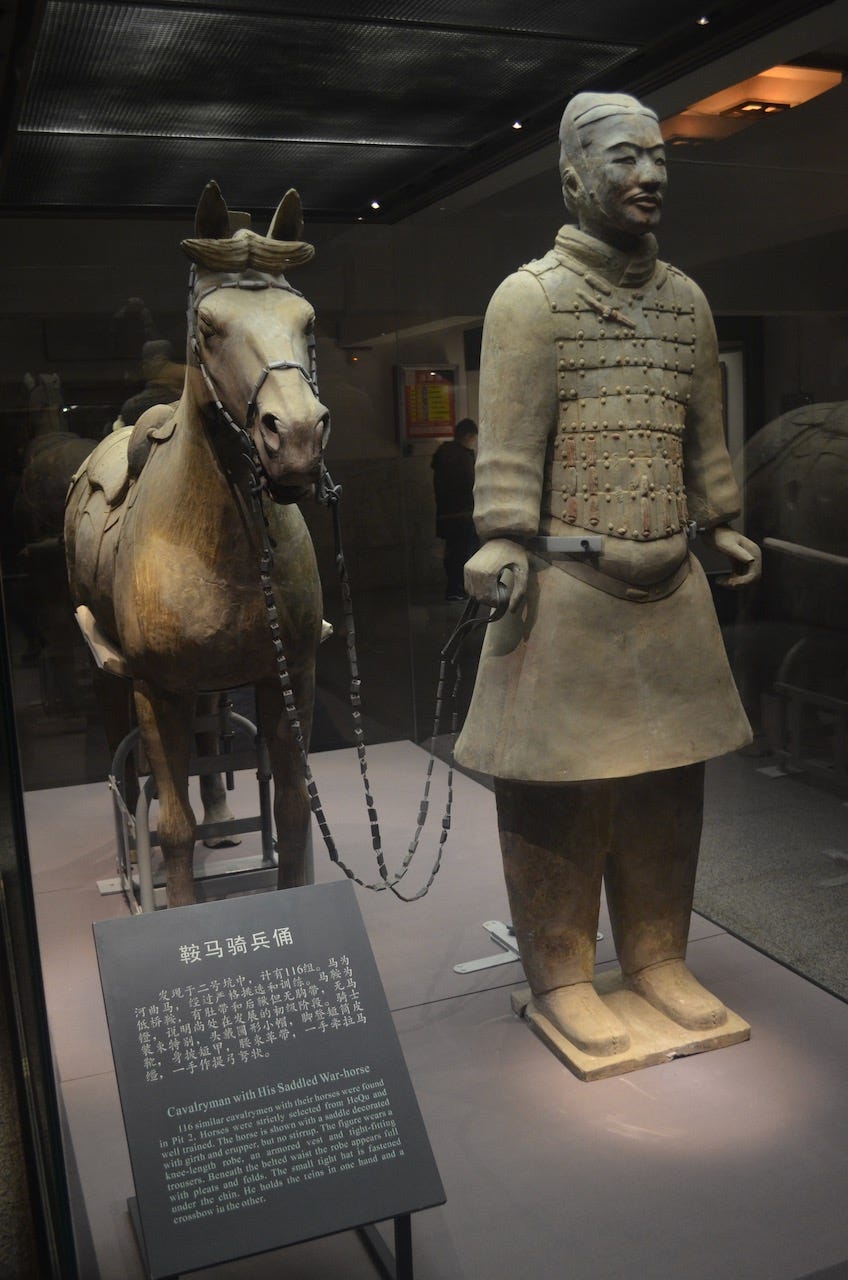Dear all,
Today I’m resuming my historical and cultural posts on China, which will now be every fortnight as I mentioned last time. Here we are looking at the First Emperor, a man with a mixed name in history, and someone better known in the West for being buried with hundreds of thousands of terracotta soldiers - a truly amazing experience if you have the chance to visit.
I’ll be back on Tuesday for some more geopolitical observations, but in the meantime please share, like, comment, and subscribe - and welcome to the latest wave of subscribers. I hope you enjoy the post.
***
China’s Terracotta Warriors are, at least in my opinion, one of the wonders of the world. Created in about 210 BC, seventy years after the last of the traditional seven was built (the Lighthouse of Alexandria), the Terracotta Army is made up of up to 700,000 life-size warriors made of clay and buried in a site measuring almost a hundred square kilometres. Located near in Xian, central China, the soldiers form part of a necropolis alongside clay reproductions of chariots, cooking gear, and perhaps incongruously a zoo, constructed to accompany into the afterlife the first person to properly unify China. That man was the Emperor Qin Shi Huangdidi, one of the most controversial people in Chinese history.
As his name suggests, Qin Shi Huangdi came from the western state of Qin, the etymological origin of “China” and one of the seven Warring States that had fought for supremacy from the year 475 BC. Situated far from the traditional core of the Chinese people, the Qin were considered slightly hick and on the fringes of the civilised world, in much the same way that that the Greeks of Athens and Thebes viewed their northern Macedonian cousins. In 361 BC the Qin throne was inherited by Duke Xiao, who, like his almost exact contemporary Philip II of Macedon (the father of Alexander the Great), set about reorganising the state with all out dominance in mind.
The reforms that he initiated were led by a scholar, administrator, and general called Shang Yang, who taught that the only way to control a country was to rule it with a hefty dose of carrot and stick. The stick was in the form of horrific collective punishment, where whole households, even villages, were put to death for an infringement. The carrot was a system of reward – for example, collecting the heads of enemy soldiers in battle – that saw its recipients promoted on merit, not family ties. As a result, Qin quickly turned into a well-ordered, efficient militaristic state, in theory strong enough to crush its neighbours. This was what Qin Shi Huangdi, a descendent of Duke Xiao, set out to prove when he inherited the throne in 247 BC at the age of thirteen.
The final destruction of the remaining Warring States took a further sixteen years, but by 221 BC major resistance had been eliminated. Although previous dynasties like the Xia and Shang had controlled swathes of the territory, their rule had never been absolute in the way that Qin Shi Huangdi now set about imposing.
Given what he achieved, it’s somewhat of a surprise that Qin Shi Huangdi (whose name means “first emperor of Qin”), has a mixed name today.
Partly this is because of his reported eccentricities. Advised by a sorcerer called Lu Sheng, the Emperor liked to use a clandestine system of tunnels to travel about, and hopped between secret locations as he tried to communicate with immortals. The people were forbidden from using his personal name in documents, and anyone who revealed his location would face execution.
Execution, and death in general, was a significant feature of his rule. Millions had died in the wars between the States, and Qin Shi Huangdi contributed more than most to this total. As well as the countless slaughtered on the battlefield, civilians perished in large numbers too, including a hundred thousand inhabitants of a city when he ordered it flooded to speed up its surrender.
He carried his battlefield habits into his post-unification rule. At the heart of his ambitions were Qin-style reforms designed to forge a properly unified state. To achieve this, he created a fully centralised administration, imposed a standardised system of weights, measures, coinage, and writing, and even dictated the axel lengths of carts to make them compatible with a new road system he had constructed. This was just one of his public works; others included the first canal connecting two river valleys, and a precursor to the Great Wall of China that was built to protect the north from marauding nomads.
This unification came at a price. The Emperor stopped at nothing in his quest to eradicate the differences that had both caused, and been created by, the tumult of the past five hundred years. This included destroying the Hundred Schools of Thought that we mentioned in Warring States newsletter – burying scholars alive was apparently his thing – and burning almost all books not relating to agriculture, medicine, astronomy, divination, or the history of the Qin.
Qin Shi Huangdi’s brutal reign may not be remembered for all the right reasons today, but his actions live on. In particular, it can be argued that the standardisation of writing has been instrumental in creating a unified sense of one China. Only around three quarters of Chinese people can speak Mandarin, the official national language, but almost everyone uses the same, standardised characters. These characters have, in Western eyes, the curious property of being legible and understandable to people who speak different languages. What this means in practice is that you can have two people of different native tongues sitting on a train reading the same newspaper; although they will both understand the meaning of the characters, the individuals will be translating the characters into different words in their heads.

A second major consequence of the First Emperor’s rule was the enlargement of China. The Qin had already conquered the enormous and fertile province of Sichuan, and under Qin Shi Huangdi they continued this expansion by pushing into what is now the lower half of China. As the regions of Xinjiang and Tibet are now experiencing, what happened next was a long period of “Han-isation”, which saw the Baiyue tribes living in the conquered lands supplanted by immense numbers of Han settlers sent down by the Emperor and his successors.
It was, ironically, Qin Shi Huangdi’s attempts to live for ever that eventually killed him. Far from extending his life, the mercury-based elixirs he imbibed brought his reign to an end just eleven years after his final conquest of the other states.
Although archaeologists broadly know where his tomb is located within the Terracotta Army necropolis, it is yet to be excavated. If the legends about what is inside it are only halfway correct then it will be an extraordinary day when it is uncovered. It is said that the Emperor recreated within it a miniature version of the China he knew, using a host of precious materials. The Yellow and Yangtse Rivers, for instance, were made from flowing mercury, the constellations recreated in pearls, and the trees carved from jade and adorned with birds’ nests of gold.
Qin Shi Huangdi’s legacy might be mixed, but it is very much alive in the public consciousness. Some have even said that he is Xi Jinping’s favourite Emperor given all he achieved. Personally I’m not so sure. Not only did neither Qin Shi Huangdi nor his dynasty last long – such had been his brutality that his son only held the throne for a few years on the throne before an uprising swept him away – but the cold-hearted, bloody rule is not the image that the Communist Party want to be linked to, despite what some in the Biden Administration might think.
That was not the same for all the Party’s rulers, however. Aptly for a man whose rule led to the deaths of tens of millions of Chinese, Chairman Mao was a fan of the First Emperor: ‘He only buried 460 scholars. We have buried forty-six thousand scholars…You condemn us as Qin Shihuangdi. But you’ve got it wrong. We have outdone him a hundredfold. You curse us for being tyrants? We never deny it. It’s a pity that your accusations fall short.”
Like Mao, Qin Shin Huangdi will never be forgotten. The question for Xi Jinping is whether people will still be writing about him after 2,000 years.




